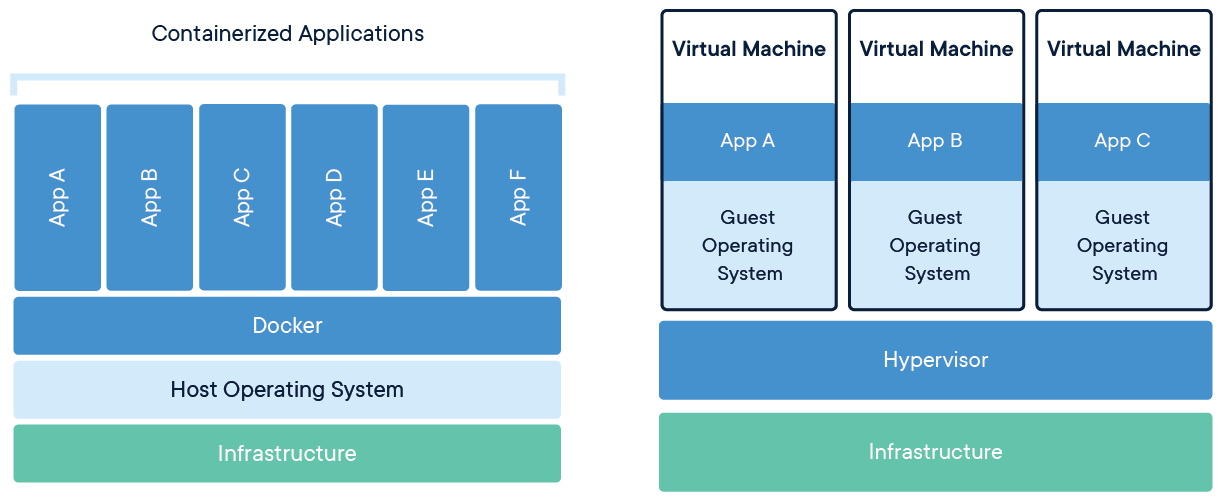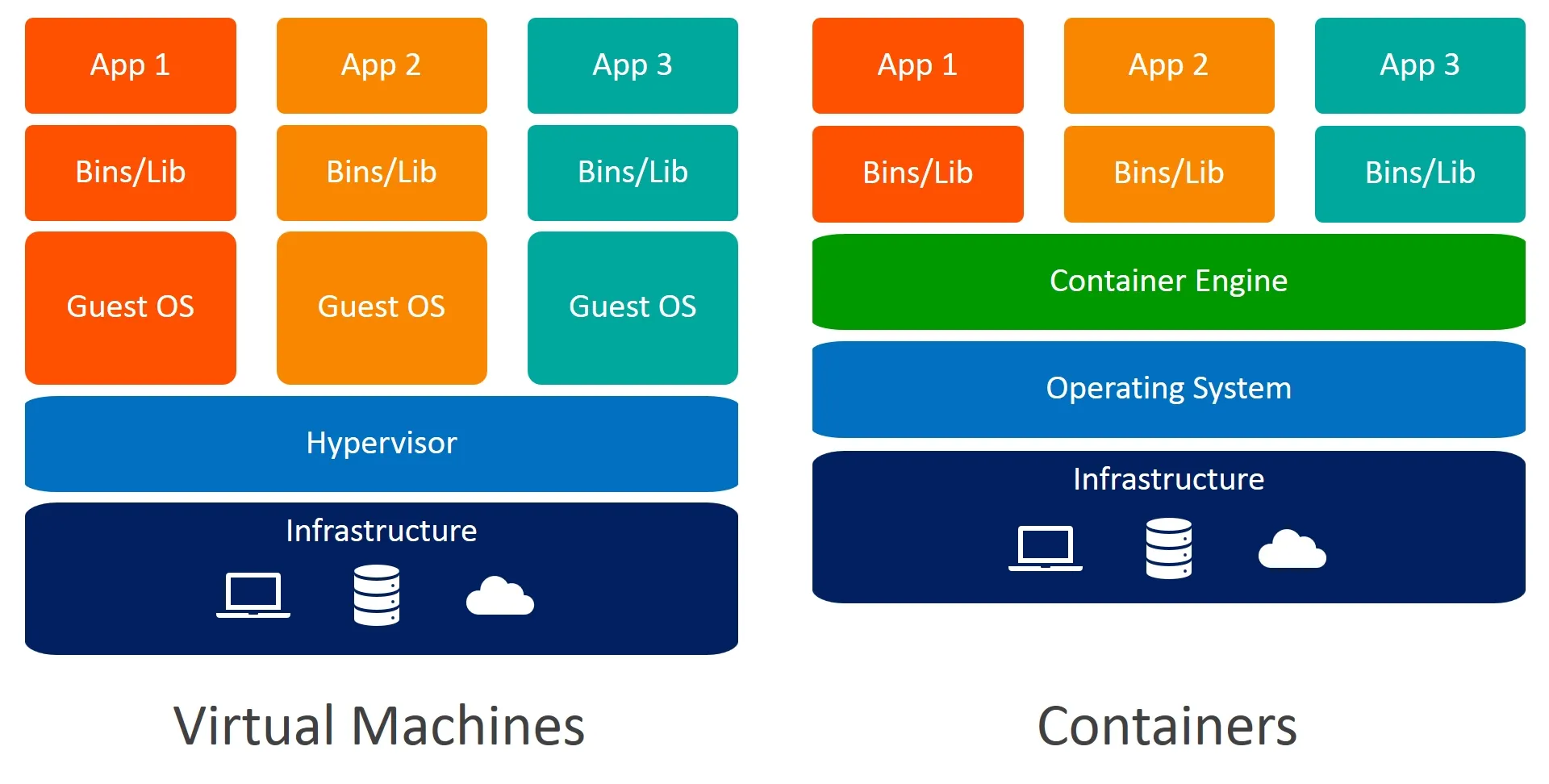Antwort Is Docker container like a VM? Weitere Antworten – Are containers the same as VMs

Containers vs VMs (virtual machines): What are the differences Virtual machines provide an abstracted version of the entire hardware of a physical machine, including the CPU, memory, and storage. Containers are portable instances of software with its dependencies that run on a physical or virtual machine.A container is a software code package containing an application's code, its libraries, and other dependencies. Containerization makes your applications portable so that the same code can run on any device. A virtual machine is a digital copy of a physical machine.Containers and virtual machines have similar resource isolation and allocation benefits, but function differently because containers virtualize the operating system instead of hardware. Containers are more portable and efficient.

Is Docker same as VMware : Docker Vs VMware Frequently Asked Questions
VMware emulates machine hardware whereas Docker emulates the operating system in which your application runs. Docker is a much more lightweight virtualization technology since it does not have to emulate server hardware resources.
Are containers replacing VMs
Both containers and virtual machines will continue to play important roles. Containers can run on VMs, enabling an organization to leverage its existing tools for automation, backup, and monitoring. Containers on VMs enable IT to use existing VM-savvy teams to manage a containerized environment as well.
Can containers replace virtual machines : Or it involves running multiple services on the same VM, which doesn't have the benefit of isolation. Despite their popularity, containers have not replaced VMs completely. In many cases, containers complement the use of VMs.
Kubernetes and virtual machines are two different platforms that are suited for different use cases. Kubernetes is designed specifically for deploying and managing containerized applications, while virtual machines are designed for running entire operating systems and applications.
A VM lets you run a virtual machine on any hardware. Docker lets you run an application on any operating system. It uses isolated user-space instances known as containers. Docker containers have their own file system, dependency structure, processes, and network capabilities.
Are containers considered virtual machines
The key differentiator between containers and virtual machines is that virtual machines virtualize an entire machine down to the hardware layers and containers only virtualize software layers above the operating system level.Docker Desktop runs a VM that requires KVM support .Performance. The last main Docker vs VM difference refers to performance: Virtual Machines are more resource-intensive than Docker containers as the virtual machines need to load the entire OS to start. The lightweight architecture of Docker containers is less resource-intensive than virtual machines.
In summary, while containers have gained a lot of popularity in recent years, they are unlikely to completely replace virtual machines. Both technologies have unique strengths and use cases that make them useful in different situations, and they often complement each other in modern application architectures.
Is Docker faster than VM : This means Docker containers are much smaller and require far fewer resources than a VM. Docker is fast. Very fast. While a VM can take an at least a few minutes to boot and be dev-ready, it takes anywhere from a few milliseconds to (at most) a few seconds to start a Docker container from a container image.
Is Docker desktop a virtual machine : Docker Desktop does not run processes directly on your Mac or Windows machine — instead Docker Desktop provides a virtual machine that runs Linux, and when you ask Docker to run a command it will run that command on this virtual machine. This is useful technology and makes Docker available to most working programmers.
Why would you run 100 containers instead of 100 VMs
containers for executing concurrent requests, containers have the advantage of process isolation. Containers allow you to process concurrent requests simultaneously with the isolation of each service. It also has less overhead compared to VMs for concurrent workload execution.
Despite their popularity, containers have not replaced VMs completely. In many cases, containers complement the use of VMs. If you want to test an application that may compromise your entire OS or need to share hardware between services running on different operating systems, you need a VM.Amazon Elastic Compute Cloud (EC2) is the Amazon Web Service you use to create and run virtual machines in the cloud (we call these virtual machines 'instances').
What is the difference between Docker desktop and Docker VM : Docker containers are running inside the virtual machine. Everything else is a consequence. Docker Desktop just tries to hide that fact from you so you don't need to setup a virtual machine and the client-server connection. Having a virtual machine is required on Windows and MacOS if you want to run Linux containers.






![csm_2405-bauerfeind-produktkategoriesseiten-bandagen-ellenbogenbandage-2560x1400_88-1_f91f66009c[1]](https://www.nakajimamegumi.com/wp-content/uploads/2024/06/csm_2405-bauerfeind-produktkategoriesseiten-bandagen-ellenbogenbandage-2560x1400_88-1_f91f66009c1-1024x521-65x65.jpg)
![Ischiasschmerzen[1]](https://www.nakajimamegumi.com/wp-content/uploads/2024/06/Ischiasschmerzen1-1024x640-65x65.jpg)
![csm_blogbeitrag_autoimmunerkrankung_d307ac8b72[1]](https://www.nakajimamegumi.com/wp-content/uploads/2024/06/csm_blogbeitrag_autoimmunerkrankung_d307ac8b721-1024x576-65x65.jpeg)